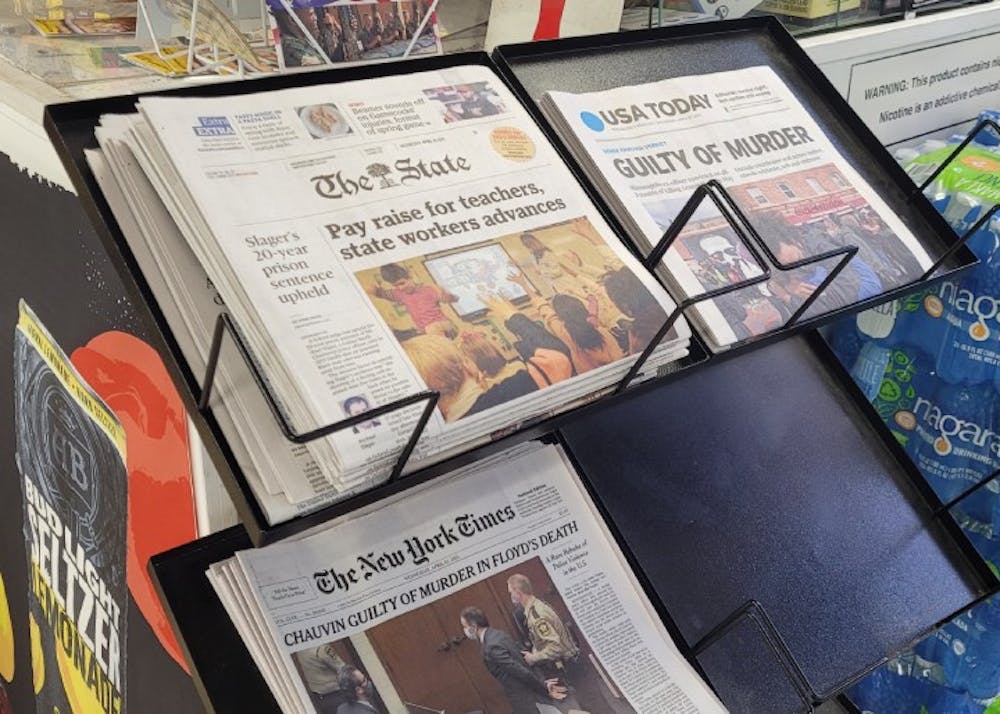Good journalism requires good journalists.
Yes, that point seems obvious. Unfortunately, some news companies have not taken it to heart. Since 2006, the formerly family-run newspaper chain McClatchy has cut more than 11,000 employees, going from more than 15,000 employees to about 3,300.
McClatchy owns five newspapers in South Carolina, including Columbia’s The State. However, the corporate situation at The State got tenser least year after McClatchy filed for bankruptcy in February.
The chain was bought by a New Jersey based hedge fund, Chatham Asset Management, in August. Chatham has its own history of laying off newspaper employees: after taking control of a Canadian newspaper company it cut 1,600 employees.
Partly in response to these corporate changes, journalists at The State announced last month that they are forming a union: The State News Guild.
On Monday, The State's management voluntarily recognized the new union, meaning that it can proceed to negotiations.
The State’s newsroom is not the first in South Carolina to unionize. Newsroom employees at The Island Packet and The Beaufort Gazette formed the Packet/Gazette Guild in September 2020 and were voluntarily recognized by McClatchy almost immediately.
Both the Packet/Gazette and The State unions are units of the Washington-Baltimore Local of The News Guild, a part of the Communication Workers of America (CWA). The CWA is an affiliate union of the AFL-CIO.
This push for unionization might seem like an internal matter for newspapers to deal with, but the opposite is true. The State’s journalists are not just organizing to defend their own interests (though that would certainly be a valid reason for unionizing), they’re also trying to defend their entire community.
Newspapers are vital institutions in Columbia, even beyond their news reporting. Maayan Schechter, a State House reporter at The State, told the story of how after reporting on South Carolina’s Real ID system, people with limited internet access or who had trouble contacting the DMV would come to her for help.
“It’s not just that we’re vital because we’re documenting history, we are informing the community, we are holding our officials accountable,” Schechter said. “We often times are vital for something as basic as ‘how can I get my COVID vaccine?’ ‘How do I get my Real ID?’”
As with any industry, a union gives newsroom employees a collective seat at the table. This power is important for all workers, but especially ones that are as vital as newspaper employees. It is best for everyone if journalists can focus on holding the powerful accountable without worrying about their newspaper or their job being cut.
The unions at The State and The Packet/Gazette are especially significant because they’re forming inside one of the most anti-union states in the country. South Carolina has the lowest unionization rate in the United States: only 2.9% of South Carolinians are union members.
SC is a “right-to-work” state, which means that employees can work in a unionized workplace without being union members themselves. This makes it harder for unions to collect dues and hurts their collective bargaining power, which results in lower wages.
However, organizers at The State were not fazed by their state’s anti-labor statutes. Joshua Boucher, a visual journalist at The State and a member of The State News Guild’s organizing committee, said that “right-to-work is more frightening than it is actually practically able to prevent us from doing what is the right thing for our jobs and also for our community."
Ultimately, workers have a constitutional right to form a union. As organizers at The State are showing, even in the the Deep South workers are able to exercise their collective power and get a seat at the table.
Now that The State News Guild has won recognition, it becomes the largest newspaper union in South Carolina, which is exemplified by the fact that the paper has existed since 1891. In a time of concern for newspapers and organized labor, unionized journalists in the Palmetto State represent a win for both.

